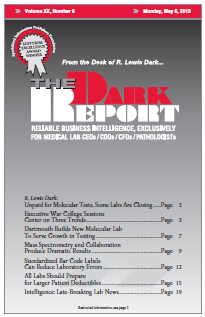CEO SUMMARY: There was an interesting blend of anxiety and optimism as a record crowd gathered in New Orleans last week for the 18th annual Executive War College on Laboratory and Pathology Management. The anxiety was rooted in the shrinking prices paid by payers for lab testing services. The optimism was based on recognition that …
Executive War College Sessions Center Upon Three Trends Read More »
To access this post, you must purchase The Dark Report.


